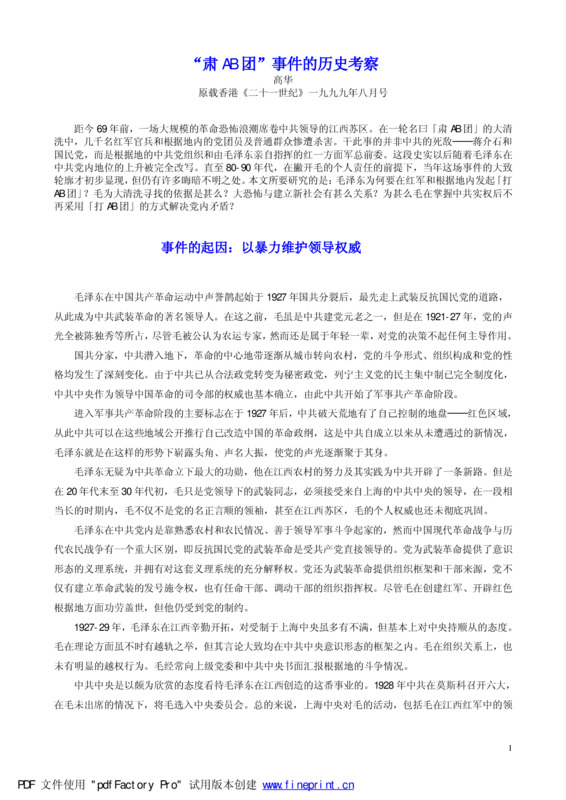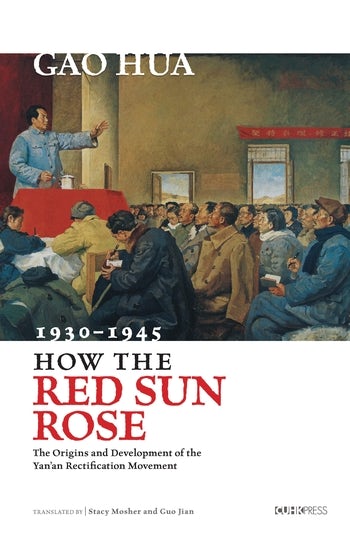Explore the collection
Showing 7 items in the collection
7 items
Book
At the Crossroads of History
This book is Gao Hua's next masterpiece after *How the Red Sun Rose*. It entails a selection of papers published by the author between 1988 and 2004, covering the fields of Republican history, Communist Party history, and contemporary Chinese history. It captures the historical interaction between the present and the past. Gao reflects deeply on the far-reaching Chinese Communist Revolution. With a rigorous and empirical research methodology, he sketches a complex and colorful picture of history, presenting the multiple facets of twentieth-century China's history.
Book
Gu Zhun and His Times
This book is about Gu Zhun, a Chinese economist, historian and philosopher. Gu Zhun was the first person to put forward the theory of China's socialist market economy, which became a key concept in the Reform era, helping to justify the use of markets in a socialist system. He also devoted himself to the study of politics, history and philosophy, translating several foreign classic works on economics and democracy and writing a large number of articles. Due to his independent thinking and dissent, he suffered repeated political persecution, including during the Anti-Rightist Campaign and the Cultural Revolution (for more information on Gu Zhun, see his biographical entry). As he personally experienced the Anti-Rightist Campaign, the Great Famine, and the Cultural Revolution, his diary is also considered a valuable source of information on these historical events. By documenting and analyzing his life, thoughts, and the eras in which he lived, Wang's book shows how Gu Zhun persisted in his "pursuit and search for the freedom and equal rights that are inherent to all human beings " (author's preface) in an era when independent thinking was suppressed. This book was published in 2015 by the Great Mountain Culture Publishing House in Hong Kong.
Article
Historical Examination of the Purge of the "AB" Regiment
More than 70 years ago, a massive wave of revolutionary terror swept through the CCP-led Jiangxi Soviet Union. Thousands of Red Army officers and soldiers, as well as members of the Party and the general public in the base area, were brutally murdered in a purge called the "Purging of the AB Troupe." Gao Hua's article examines why Mao Zedong initiated the "purge of the AB Group" in the Red Army and the base areas. What was Mao's rationale for the Great Purge? What is the relationship between the Great Terror and the establishment of a new society? Why did Mao stop using the "Fighting the AB Groups" as a means of resolving internal conflicts in the Party after he assumed real power in the CCP?
Book
How the Red Sun Rose
Originally published in Hong Kong in Chinese in 2000, Gao Hua’s epic description of an early Communist Party campaign against dissent describes a pattern of thought reform and control that would hold true for decades to come. Written despite official harassment and Gao’s failing health, How the Red Sun Rose is a touchstone for China’s unofficial history movement. It was translated into English in 2019 and published by Columbia University Press. Purchase here: https://cup.columbia.edu/book/how-the-red-sun-rose/9789629968229.
Film and Video
Not the Foreign Force
During the three years of the "zero-COVID" policy enforced by Xi Jinping's government, the daily life and freedoms of the people were severely limited. A fire in Urumqi, Xinjiang, finally ignited public dissatisfaction with the measures. On November 26, 2022, when the people of Shanghai spontaneously gathered in the streets to mourn the victims of the fire, no one expected that this memorial activity would lead to nationwide protests against the pandemic policies. At the scene, Chen Pinlin and his girlfriend, Wang, filmed many protest videos at the protest site on Urumqi Middle Road in Shanghai.
In November 2023, on the anniversary of the White Paper Movement, Chen Pinlin uploaded the documentary to YouTube and other social media platforms, garnering hundreds of thousands of views. Less than a week later, he and his girlfriend were arrested. His girlfriend was released on bail, while Chen Pinlin remained in custody.
<a href=“https://tenchu.org/pocd/public/pocs/3551”>Chen Pinlin introduced the documentary as follows</a>: "I am the director Plato. In November 2022, I personally participated in the protest on the night of November 26 in Shanghai. This was my first involvement in a political event in China, and it was also the first time I expressed my political demands in China. Besides the footage I personally filmed on that day, the film also includes iconic video materials from before and after the protest. I tried to present a complete picture of how the dynamic zero-COVID policy pushed China to the boiling point and prompted people to take to the streets to protest. After the event, the Chinese government distorted the facts and maliciously smeared the protests in Shanghai and the White Paper movement, misleading many people into thinking that the protests were the work of foreign forces. But is this really the case? On the first anniversary of the Shanghai Urumqi Road protest, I created this documentary, “Urumqi Middle Road”, to record my personal experience and feelings of participating in the protest. I want to explore why, when internal contradictions appear in China, foreign forces are always blamed? Everyone knows the answer. The more the government misleads, forgets, and shields the truth, the more we must speak out, remind people, and remember. Remember the White Paper, remember November 26, remember Urumqi Middle Road, remember the Xinjiang fire, remember the Guizhou bus, remember dynamic zero-COVID, remember the 'big white' (the white-suited workers), remember Tiananmen, remember the Cultural Revolution, remember the Three Years of Great Famine. "By remembering the ugliness, we can turn our hearts toward the light. I also hope that China can soon embrace its own brighter future."
At the end of this movie, Chen left this narration: Some people say, what is the point of protesting on the streets? In the end, it's still the same, suppressed, shielded and misinterpreted. But as Churchill said, ‘Courage is the most important human trait, with courage, other human traits can naturally be possessed' We lacked experience and have been cowardly and wavering, but today we have the courage to stand up and to speak out. What we lacked this time, we can do better next time. If I were to do it again, I would still choose to be there. Because a government that is afraid of even a white paper can't defeat the justice in the hearts of the people.
On January 5, 2024, Chen Pinlin was formally arrested on suspicion of "picking quarrels and provoking trouble" and detained at Baoshan District Detention Center in Shanghai. On January 6, 2025, Chen Pinlin’s first trial was held in the Third Court of Baoshan District Court, where he was sentenced to 3 years and 6 months in prison. His sentence will end on May 27, 2027.
Book
The Brothers Mingjian Xue & Yefang Sun
This book concerns two Chinese economists, Xue Mingjian and Sun Yefang. Xue Mingjian (1895-1980, former name Xue Epei, he changed his name after joining the volunteer student armies during the 1911 revolution - Mingjian (明剑) meant “to eliminate the Qing government with sword and revenge on behalf of the Ming Dynasty (剑除满清,为朱明报复)” ) was "the founder of modern Chinese national enterprise economics, the pioneer of modern national industry, a civil society activist, educator and scholar" (author's preface). He served as a delegate to the National People's Congress of the Republic of China, Senate member of the Kuomintang, and a popularly elected legislator. Sun Yefang (1908-1983, former name Xue Eguo, he changed his name out of security concern after the incident that he got arrested by KMT when he was a underground CCP member), by contrast, a member of the Communist Party of China, was an important economist in post-1949 China, who was persecuted during the Cultural Revolution and regained attention and respect after the reform and opening-up period. The author tells the story of the two brothers' very different life trajectories, while pointing out that even though they were in different political camps, their concern for and practice of humanitarianism were in fact the same.
The book was first published by China SDX Joint Publishing in 2009, and was to be reprinted by Economic Press China in 2014, but it was censored. The version in our archive is published by Boden House in 2023.
Book
The Realm of Historiography
This book is a compilation of some of Gao Hua's speeches, book reviews, commentaries on current affairs, reviews of student papers, and lecture transcripts. It includes his studies and reflections on themes around revolution, civil war, and nationalism, his comments on the works of Long Yingtai, Wang Dingjun, and Mao Zedong, and his observations on Taiwan's social and political realities during his visits to Taiwan. In addition, the book contains a selection of Gao Hua's lecture notes on the theory and methodology of historiographical research, as well as on the production of official historical narratives and the development of folk history, enabling readers to gain further understanding of the philosophy and methodology behind Gao Hua’s research.
The book was published by Guangxi Normal University Press in November 2015 before the fourth anniversary of Gao Hua's death, for which the publisher was disciplined by the Central Propaganda Department and the State Administration of Press, Publication, Radio, Film and Television.






